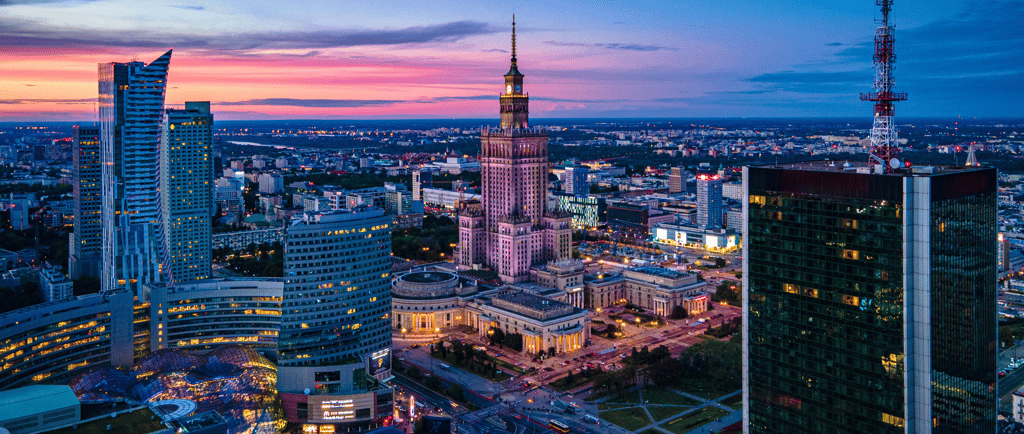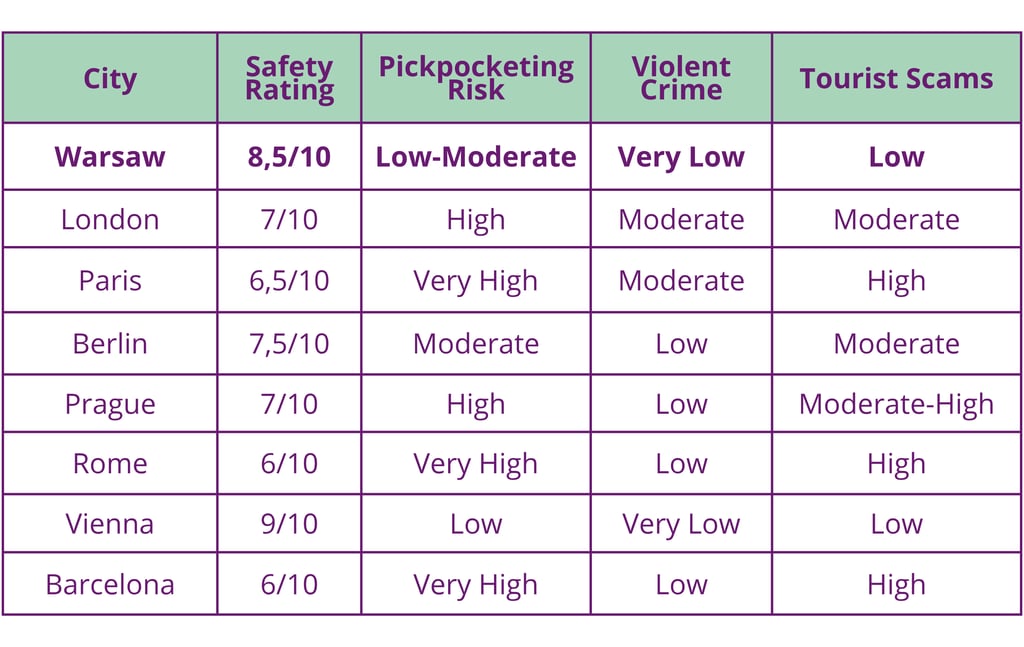Is Warsaw Safe for Tourists? Complete Safety Guide 2025
Warsaw is very safe for tourists! Get essential safety tips, scam warnings, emergency contacts, and solo travel advice for a worry-free visit. Our complete 2025 guide covers crime rates, neighborhood safety, transportation tips, and why Warsaw ranks among Europe's safest capitals.
Karolina K.
10/2/20259 min read


Is Warsaw Safe for Tourists? Complete Safety Guide 2025
Planning a trip to Poland's capital and wondering "is Warsaw safe?" The short answer: yes, Warsaw is very safe for tourists. This modern European city has low crime rates, efficient emergency services, and welcomes millions of visitors each year without incident. Whether you're traveling solo, with family, or exploring the nightlife, this complete safety guide for 2025 will help you navigate Warsaw confidently and avoid common pitfalls.
Warsaw ranks among Europe's safest capitals, but like any major city, it pays to stay informed. This guide covers everything from neighborhood safety to emergency contacts, helping you enjoy your visit worry-free.
Overall Safety Rating & Crime Statistics
Warsaw's safety rating: 8.5/10 – Excellent for tourists.
According to recent data, Warsaw consistently ranks as one of the safest European capitals. Here's what the numbers tell us:
Violent crime – Extremely rare for tourists. Warsaw has a violent crime rate significantly lower than London, Paris, or Rome. Random attacks on tourists are virtually unheard of.
Petty theft – Low to moderate, primarily pickpocketing in crowded tourist areas. Most visits are incident-free, but standard precautions apply.
Scams – Minimal compared to other European cities. The most common issues involve taxi overcharging and restaurant bill padding in tourist traps.
Terrorism risk – Very low. Poland has had no significant terrorist incidents in recent years, and Warsaw maintains strong security at public events.
Political stability – High. While Poland has political debates like any democracy, these don't affect tourist safety.
Women's safety – Very good. Warsaw is safe for solo female travelers, though standard nighttime precautions apply.
Warsaw's police force is professional, visible in tourist areas, and many officers speak English. The city's extensive CCTV network and well-lit streets contribute to the overall safe environment.
Safe vs Unsafe Areas in Warsaw
Warsaw is generally safe throughout, but some neighborhoods are more tourist-friendly than others.
Very Safe Areas (Day & Night)
Old Town (Stare Miasto) – The historic heart of Warsaw is heavily policed and tourist-oriented. Safe at all hours, though watch for pickpockets during peak season.
New Town (Nowe Miasto) – Quiet, residential, and perfectly safe. Popular with families and couples.
City Center (Śródmieście) – The business and shopping district around Złote Tarasy and Palace of Culture is safe, busy, and well-lit after dark.
Wilanów – Upscale residential area with the royal palace. Very safe, though quieter at night.
Łazienki Park area – Safe during opening hours. Beautiful for daytime walks, though the park closes at dusk.
Mokotów – Residential neighborhood popular with expats. Safe and family-friendly.
Areas Requiring Normal Caution
Praga (North & South) – Once gritty, now gentrifying rapidly. Praga Południe (South Praga) has trendy bars and galleries and is generally safe, though less polished. Avoid poorly lit side streets late at night.
Wola – Mixed residential and commercial area. Safe overall, but some sections feel less welcoming after dark. Stick to main streets.
Targówek – Working-class residential area. Not dangerous, but offers little for tourists and can feel isolated at night.
Areas to Avoid at Night
Warsaw Central Station (Warszawa Centralna) surroundings – The immediate area around the station can attract homeless individuals and occasionally intoxicated people late at night. The station itself is safe, but surrounding streets (especially toward Złota Street) are best avoided after 11 PM.
Remote sections of Praga Północ – Deep into North Praga, away from the gentrified areas, streets can feel unwelcoming at night. Not necessarily dangerous, but uncomfortable for tourists.
Bródno and Białołęka – Far-flung residential districts with no tourist attractions. Not dangerous, but isolated and far from help if needed.
Reality check: Even Warsaw's "unsafe" areas are relatively mild compared to problem neighborhoods in Western European cities. You're unlikely to encounter serious issues anywhere in Warsaw with basic street awareness.
Common Tourist Scams to Avoid
Warsaw has fewer scams than most European capitals, but stay alert for these:
Taxi Overcharging
The scam: Unlicensed taxis at the airport or near tourist sites charge 3-5 times normal rates, sometimes over 200 PLN for a 50 PLN ride.
How to avoid: Use only official taxi companies (look for company name, phone number, and taxi sign on roof). Better yet, use Uber, Bolt, or FreeNow apps for transparent pricing. At the airport, use the official taxi rank or pre-book through your hotel.
Cost comparison: Airport to city center should cost 40-60 PLN by taxi, 20-30 PLN by Uber.
Restaurant Bill Padding
The scam: Tourist-trap restaurants add items you didn't order or charge for bread/water that appeared complimentary.
How to avoid: Always check the bill before paying. If something looks wrong, question it politely but firmly. Avoid restaurants with aggressive touts outside—these are often overpriced.
Red flags: Menus without prices, locations directly on Market Square, staff who pressure you to enter.
Currency Exchange Offices ("Kantor")
The scam: Some exchange offices near tourist sites offer terrible rates or add hidden fees, converting €100 into 30% less złoty than fair market value.
How to avoid: Use ATMs from major banks (PKO BP, mBank, ING) for the best rates. If using a kantor, check current exchange rates on Google first and compare. Avoid offices with "0% commission" signs—they hide the markup in poor rates.
Best practice: Withdraw złoty from bank ATMs or use credit cards. Most places accept cards anyway.
Fake Police Officers
The scam: Rare but reported occasionally—fake police ask to "check your wallet for counterfeit money" and steal cash.
How to avoid: Real police will never ask to inspect your wallet or cash. If approached, politely decline and walk toward a public place. Real officers will have proper ID badges and patrol cars nearby.
Club Entry Scams
The scam: Strip clubs or "gentleman's clubs" in the city center lure tourists with promises of free entry, then hit them with enormous drink bills (sometimes thousands of złoty).
How to avoid: Simply avoid these establishments. Legitimate nightlife in Warsaw doesn't operate this way. If something feels off, leave immediately.
Transportation Safety Tips
Warsaw's public transportation is safe, efficient, and extensively covered by cameras.
Metro Safety
The Warsaw Metro (lines M1 and M2) is clean, modern, and very safe. Stations have security guards, and trains run until late night.
Safety tips:
Keep bags zipped and close during rush hour (7-9 AM, 4-6 PM)
Late-night trains (after midnight) are safe but less crowded—stay in cars with other passengers
Emergency intercoms are in every car and at every platform
Tram & Bus Safety
Warsaw's extensive tram and bus network is safe day and night. Vehicles are well-maintained and routes cover the entire city.
Safety tips:
Validate your ticket immediately (inspectors fine unvalidated tickets heavily)
Watch for pickpockets on crowded trams, especially routes 15, 18, and 22 in the city center
Night buses (marked with "N") are safe but less frequent—check schedules on Jakdojade app
Taxi & Rideshare Safety
Safest options: Uber, Bolt, FreeNow apps show driver info, license plates, and fixed prices.
Licensed taxi companies: Ele Taxi, Taxi Sawa, Super Taxi, and MPT are reputable. Avoid unmarked vehicles.
Cost expectations: Short rides 15-25 PLN, airport transfers 40-60 PLN, longer journeys 50-80 PLN.
Bicycle & Scooter Safety
Warsaw has improved cycling infrastructure but still has challenges.
Safety considerations:
Bike lanes exist but aren't always continuous—expect to share road with cars sometimes
Wear a helmet (not required by law but recommended)
Lock bikes securely—theft is the main risk
Electric scooters (Lime, Bolt) are convenient but be cautious on cobblestones
Walking Safety
Walking is the best way to see Warsaw, and pedestrian safety is generally excellent.
Tips:
Crosswalks are well-marked and drivers usually stop, but always make eye contact
Watch for trams—they have right of way and can't stop quickly
Sidewalks can be uneven in older areas; watch your step, especially after rain
Well-lit main streets are safe at night; stick to busy routes after dark
Nightlife Safety Guidelines
Warsaw's nightlife is vibrant and safe, with something for everyone from jazz clubs to techno venues.
Bar & Club Safety
Safe nightlife areas:
Nowy Świat Street – Upscale bars and lounges, heavy foot traffic, safe until late
Pawilony (near Nowy Świat) – Alternative bars in converted storage units, quirky and safe
Plac Zbawiciela – Trendy neighborhood bars, young crowd, very safe
Praga Południe bars – Hipster area with craft beer spots, generally safe but less polished
Safety tips:
Never leave drinks unattended (though drink spiking is rare in Warsaw)
Stick with friends, especially when moving between venues
Use ride-sharing apps for late-night returns to your accommodation
Watch your belongings in crowded clubs—pickpockets target distracted partiers
Know your limits—Polish vodka is strong!
Solo Travel Nightlife Safety
For solo female travelers: Warsaw is safer than most European capitals for women going out alone. That said, basic precautions apply:
Let someone know your plans and expected return time
Stick to well-known venues rather than following strangers to "exclusive" parties
Trust your instincts—if a situation feels wrong, leave
Keep your phone charged for maps and emergency contacts
Consider joining pub crawls or group activities to meet other travelers safely
For all solo travelers: Warsaw locals are generally respectful and helpful. Harassment is less common than in Southern European cities, though street smarts always apply.
Late-Night Safety
Warsaw stays lively until late, especially on weekends. Main streets remain busy until 2-3 AM.
After midnight:
Main routes (Nowy Świat, Krakowskie Przedmieście) stay populated and safe
Residential streets get quiet—stick to major roads
Night buses and Uber are reliable for getting home
Avoid the area immediately around Central Station after midnight
Emergency Contacts & Useful Numbers
Save these before you arrive:
Emergency Services (English-speaking operators):
112 – Universal emergency number (police, fire, ambulance)
997 – Police direct line
999 – Ambulance direct line
998 – Fire department direct line
Tourist Support:
19115 – Warsaw city hotline (some English support)
+48 22 278 77 77 – Tourist information center
Medical Assistance:
+48 22 826 00 26 – LIM Medical Center (private, English-speaking, 24/7)
+48 22 566 22 22 – Medicover (private medical, many locations)
+48 22 836 44 88 – Damiana Medical Center (private, Old Town)
Important Services:
+48 22 500 11 11 – Taxi Sawa (licensed taxi)
+48 22 919 19 19 – Uber support hotline Poland
+48 22 666 11 21 – Warsaw Central Station information
Your Embassy – Look up your embassy's 24/7 emergency contact before traveling. Most are located in central Warsaw.
Lost Items
Metro lost & found: +48 22 333 43 34
Public transport lost & found: ul. Zawiszy 1/3 (near Warszawa Zachodnia station)
Police non-emergency: 997 or nearest police station (posterunek)
Health & Medical Safety
Warsaw has excellent healthcare, though navigating the system requires some knowledge.
Medical Care Quality
Public healthcare – Good quality but can have long waits. EU citizens with European Health Insurance Card (EHIC) can access public clinics.
Private healthcare – Excellent quality with minimal wait times. English-speaking doctors are common. Costs are reasonable compared to Western Europe.
Pharmacies (Apteka) – Found everywhere, recognizable by green cross signs. Pharmacists are knowledgeable and often speak English. Many medications available over-the-counter that require prescriptions elsewhere.
Common Health Concerns
Tap water – Completely safe to drink throughout Warsaw. No need to buy bottled water.
Food safety – Very high standards. Food poisoning is rare. All restaurants undergo regular inspections.
Air quality – Can be poor in winter months (December-February) due to heating. Check apps like Airly if you have respiratory conditions.
Allergies – Pollen counts can be high in spring (April-May). Pharmacies stock allergy medications.
Insect-borne diseases – No malaria, dengue, or serious mosquito-borne illnesses. Tick-borne encephalitis exists in rural Poland but is not a concern in Warsaw.
COVID-19 & Travel Health (2025)
As of 2025, COVID-19 restrictions in Poland are minimal. Check current requirements before traveling, but expect:
No mask mandates in most settings
No proof of vaccination required for entry
Standard health recommendations for respiratory illness season (winter)
Travel Insurance
Highly recommended. Medical care in Warsaw is affordable compared to the US, but travel insurance provides:
Coverage for private clinics and hospitals
Emergency evacuation if needed
Lost luggage and trip interruption protection
24/7 assistance in English
Cost: Comprehensive travel insurance runs €20-50 for a week-long trip.
Warsaw Safety vs Other European Cities
How does Warsaw stack up against other popular European destinations?
Warsaw's advantages:
Lower pickpocketing risk than Western European capitals
Minimal violent crime affecting tourists
Fewer aggressive scams and tourist traps
More affordable security measures (safer neighborhoods cost less)
Helpful, honest local population
Efficient, safe public transportation
Warsaw ranks alongside Vienna, Copenhagen, and Helsinki as one of Europe's safest capitals for tourists.
Safety Tips for Solo Travelers
Is Warsaw safe for solo travel? Absolutely. Here's how to maximize your safety:
For Solo Female Travelers
Warsaw is one of Europe's better cities for women traveling alone:
Daytime safety – Excellent. Explore freely, use common sense.
Nighttime safety – Good with precautions. Stick to well-lit, populated areas. Main tourist zones remain busy until late.
Harassment levels – Lower than Southern Europe. Catcalling is less common, and locals generally respect personal space.
Accommodation – Hostels, hotels, and Airbnbs are all safe. Choose accommodations in central neighborhoods (Śródmieście, Mokotów) for convenience.
Meeting locals – Poles are generally reserved but warm up when approached respectfully. Language exchange meetups and food tours are great for making connections.
General Solo Travel Tips
Share your itinerary with someone back home
Keep copies of important documents in cloud storage
Use Google Maps offline mode for navigation without data
Join group tours or activities to meet other travelers
Trust local advice—Warsaw residents are helpful and honest
Learn basic Polish phrases—effort is appreciated
Final Safety Recommendations
Is Warsaw safe? Yes, and you'll likely find it safer and more relaxed than expected. With basic awareness and these guidelines, you'll have a worry-free visit.
Key takeaways:
✅ Warsaw is very safe for tourists, including solo travelers
✅ Violent crime is rare; petty theft requires normal city precautions
✅ Avoid unlicensed taxis and tourist-trap restaurants
✅ Public transportation is safe, modern, and reliable
✅ Emergency services are efficient and accessible
✅ Healthcare quality is very good and affordable
✅ The city ranks among Europe's safest capitals
The biggest "danger" in Warsaw? Overindulging in pierogi and Polish vodka. Enjoy your trip, stay aware, and embrace all this incredible city has to offer!
Have specific safety questions about Warsaw? The city's tourist information centers, your accommodation hosts, and local police are all helpful resources. Warsaw wants you to have a safe, memorable visit—and with this guide, you're well-prepared to do exactly that.


Contact
Contact us via email:
Subscribe to our newsletter!
office@tellmemoretravel.com
© 2025. All rights reserved.
